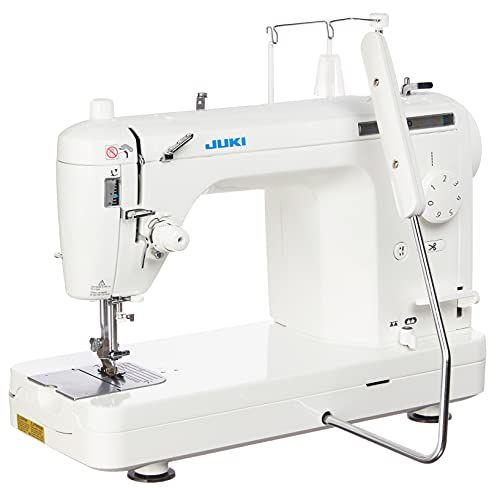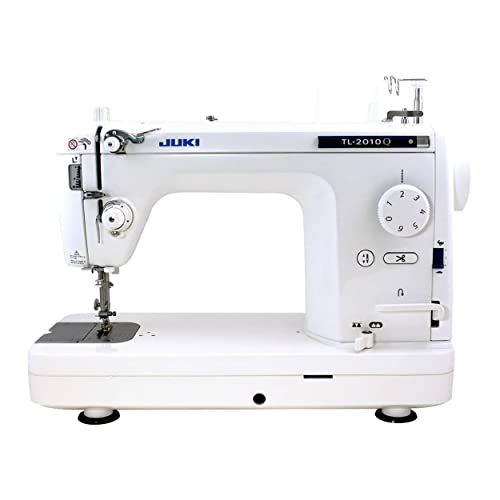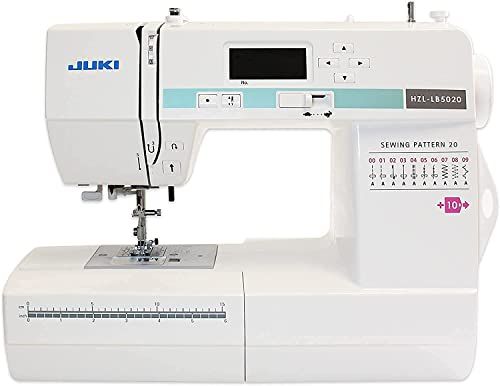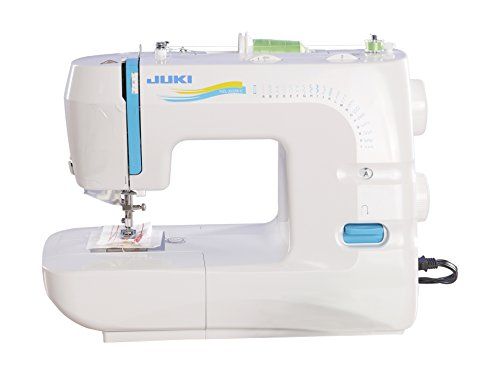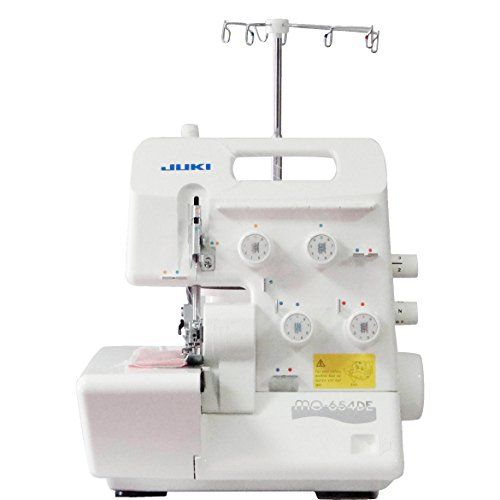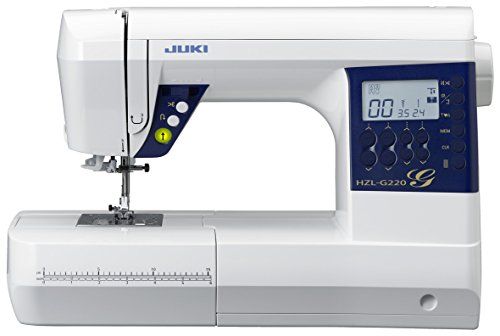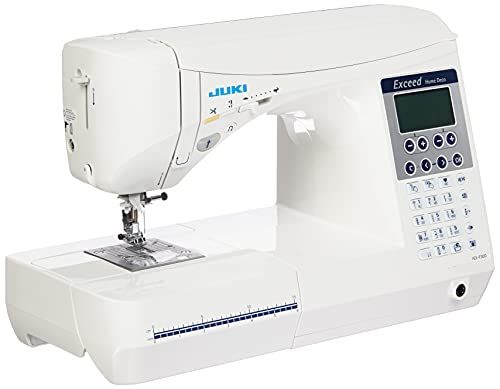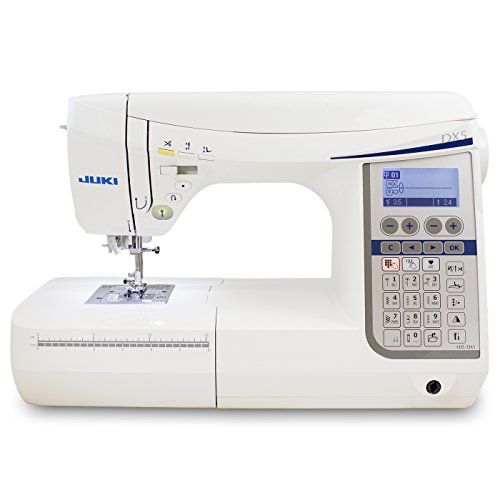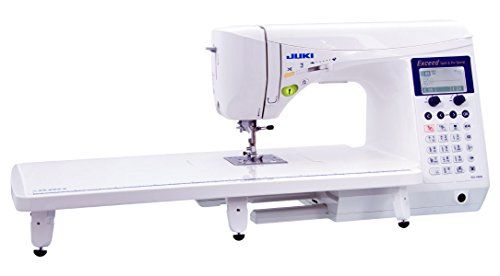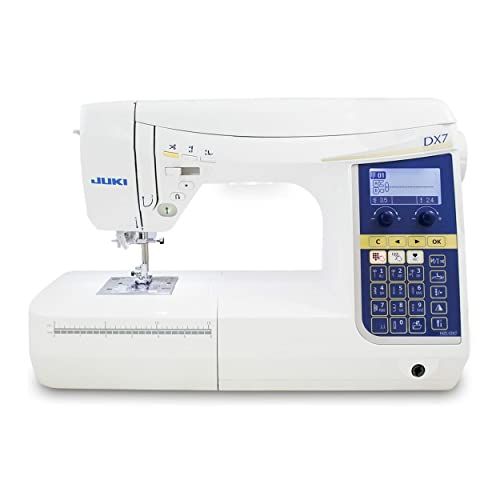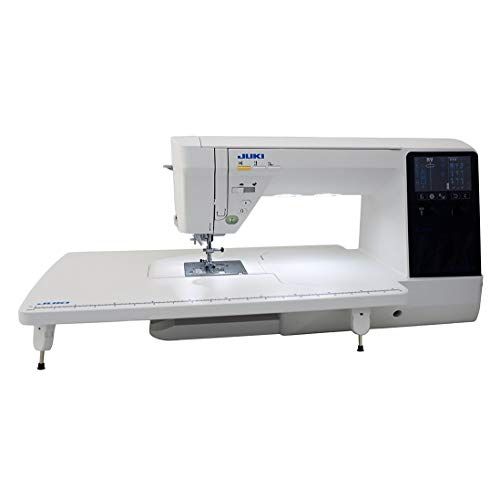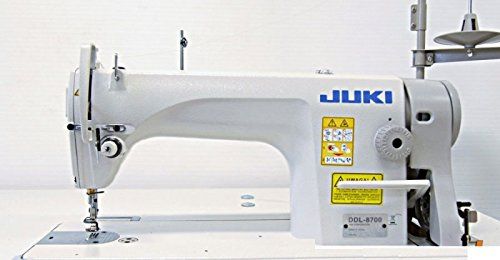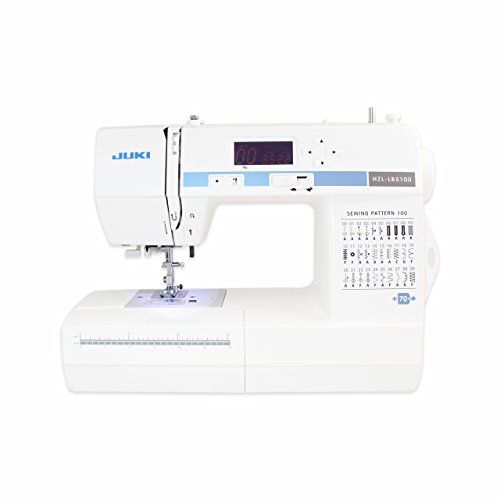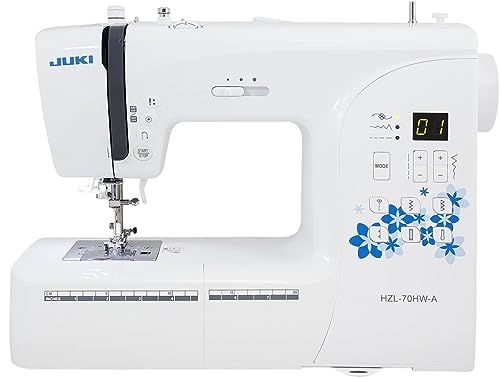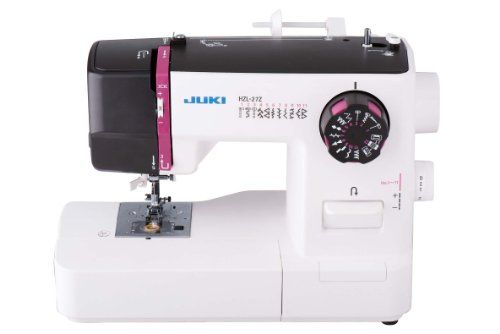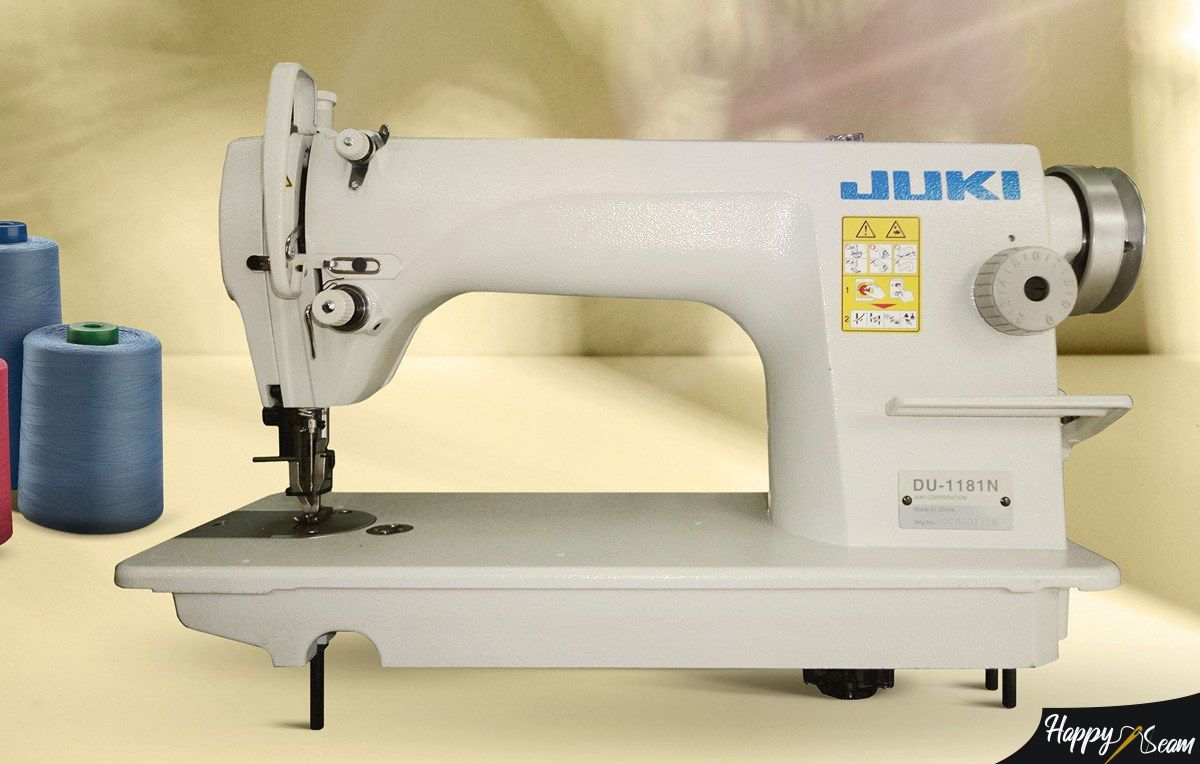
Juki is a well-known and respected brand in the sewing machine industry. Founded in 1938 in Tokyo, Japan, Juki has over 80 years of experience producing high-quality sewing machines for both home sewing and industrial use.
Juki sewing machines are known for their precision, performance, reliability and ease of use. While they may not be the cheapest option on the market, Juki machines are a worthwhile investment for any sewist looking for a workhorse machine that will provide many years of consistent service.
The key strengths of Juki sewing machines include:
Popular Juki Sewing Machine Models
Juki is known for making high-quality sewing machines for both home sewists and industrial applications. Here are some of their most popular models:
Juki HZL-F600
The Juki HZL-F600 is a computerized sewing and quilting machine. It has 225 built-in stitches including utility, decorative, and font stitching. The HZL-F600 features an automatic thread trimmer, easy needle threading system, and a large sewing bed for quilting projects. This model is beginner-friendly but has features advanced sewers appreciate.
Juki MO-1000
The Juki MO-1000 is a semi-industrial sewing machine. With a powerful motor and speeds up to 1,500 stitches per minute, it can handle thick fabrics like denim with ease. The MO-1000 is made with an aluminum die cast arm for stability and durability during high-speed sewing. This model is great for frequent home sewists or small businesses.
Juki TL-2000Qi
The Juki TL-2000Qi is one of Juki's top-of-the-line sewing and quilting machines. It has an automatic thread cutter, knee lift, and extra high presser foot lift for thick fabrics. With a large work area and extension table capabilities, the TL-2000Qi excels at quilting, home decor, and garment sewing. The stitch quality on this model is excellent.
Juki Sewing Machine Features
Juki sewing machines are known for their innovative features that make sewing easier and deliver professional results. Some of the standout features include:
Box Feed Technology: Juki sewing machines use a box feed rather than a traditional drop feed system. This gives better control and visibility when sewing multiple layers or thick fabrics. The box feed provides even feeding through the machine for consistent stitch quality.
Servo Motors: Higher-end Juki models utilize servo motors rather than standard motors. Servo motors provide more power and faster acceleration, allowing the machine to sew at very high speeds with precision. This results in incredible stitch quality even at full speed.
LED Lighting: Many modern Juki machines are designed with LED lighting to illuminate the sewing area. This provides excellent visibility when working on projects or sewing dark fabrics. The long-lasting LED lights are bright but cool in temperature.
Easy Threading: Most Juki machines have easy threading systems that allow you to thread the needle simply by following numbered guides. This saves time and frustration when changing threads. Some models have automatic needle threaders as well.
Computerized Controls: Juki computerized sewing machines allow you to select stitches and adjust settings like length and width through an LCD screen. This makes it simple to dial in the perfect stitch for your project. The machines store a wide variety of utility and decorative stitches.
Knee Lifter: Many Juki models come with an ergonomic knee lifter to raise and lower the presser foot. This keeps your hands free for fabric control.
Juki stands out for its use of the latest technology to make sewing and quilting tasks faster, easier and more precise. Key innovations like the box feed system really set Juki machines apart from competitors.
Ease of Use
Juki sewing machines are known for being very beginner-friendly. They have a number of features that make sewing easier, even for someone who is just learning.
One helpful feature is the automatic thread cutter. After finishing a seam, you simply push a button and the machine will snip the top and bobbin threads for you. No more reaching for scissors or worrying about leaving long thread tails. This makes sewing faster and more efficient.
Many Juki models also come with a knee lifter for the presser foot. This means you can keep your hands on your project but still easily lift the presser foot up and down by tapping your knee on the lever. This helps beginners avoid fumbling around trying to coordinate lifting the presser foot and fabric at the same time.
The controls and settings on a Juki machine are designed to be user-friendly as well. Stitches are selected by simply turning a dial, and the optimal settings are often preset so you don't have to guess. The manuals are written clearly too, so even without prior experience, you'll be able to thread your machine and get sewing fairly quickly.
With features like these, Juki sewing machines are versatile enough for beginners but advanced enough to grow with more experienced sewers. The ease of use makes Juki a top choice for someone looking to learn or brush up on their sewing skills.
Sewing Speed
Juki sewing machines are known for their versatility when it comes to sewing speed. They offer models for both slow precision work and very fast sewing.
On the slower end, machines like the Juki HZL-F300 allow you to sew at speeds between 200-900 stitches per minute. This makes them ideal for detailed sewing and embroidery where you need complete control. The maximum speed is slow enough for beginners learning to sew as well.
For medium speeds, options like the Juki TL-2000Qi allow sewing between 1500-2200 stitches per minute. This gives you flexibility for sewing most types of projects. The speed is fast enough for efficiency but still controllable.
On the fastest end, Juki's industrial machines can reach speeds over 5000 stitches per minute. The Juki LU-2810 for example, can sew at up to 9000 spm. These ultra high speeds are perfect for production sewing and sewing large quantities rapidly.
So whether you need precision and control for embroidery, efficient speeds for most projects, or industrial velocity for production environments, Juki has a model to match your needs. Their range of sewing speeds makes them versatile for sewers and businesses alike.
Stitch Quality
Juki sewing machines are renowned for their excellent stitch quality and precision. The stitching is tight and consistent with very little puckering on all types of fabrics. Even at high speeds, Juki machines produce stitches that are perfectly spaced and balanced.
This is thanks to Juki's high-quality parts and precision engineering. For example, the needle bar stroke on most models is optimized to pierce fabric cleanly. Juki machines also have specialized feed dog mechanisms that grip and advance fabric smoothly. This prevents uneven stitch length or fabric shifting while sewing.
Vibration is minimized through the machine's sturdy build and internal components. Juki uses materials like diecast aluminum to absorb vibration. The internal mechanisms are finely balanced to operate with little motion. This results in neat, professional stitching and less operator fatigue.
Overall, Juki's stitch quality is unmatched. The tight, even stitches allow sewers to complete projects faster with professional-looking results across all fabrics. This quality is consistent even at high speeds, making Juki a top choice for apparel manufacturing. Home sewers can also achieve couture-level garments thanks to Juki's excellent stitch precision.
Reliability
Juki sewing machines are known for their reliability and durability, even with frequent use over many years. The mechanical design and sturdy build quality allows Juki machines to continue operating smoothly over decades of sewing projects.
Many sewing enthusiasts comment that their Juki sewing machine keeps running like new after 5, 10 or even 20+ years of regular use. There are many stories of these machines being passed down in families for generations while still maintaining functionality and performance.
The longevity of Juki sewing machines is aided by the precision engineering and tight tolerances of the moving components. Everything is designed to fit together perfectly and operate efficiently over thousands of hours of use. The motors used in Juki machines have a reputation for smooth and quiet operation that holds up over many years.
Overall, those looking for a sewing machine that will provide consistent, flawless stitching over decades are wise to choose Juki. The brand is synonymous with reliability and stands behind their products with lengthy warranties. Even with frequent daily use, a Juki sewing machine will likely keep running reliably for many years to come.
Warranty
Juki sewing machines come with a standard warranty that provides customers with peace of mind on their purchase. The length and coverage of Juki's warranty depends on the specific model, but most machines have a warranty of around 5 years.
The warranty covers any defects in materials or workmanship under normal use. This protects against things like mechanical breakdowns or faulty parts. If anything goes wrong with the machine during the warranty period that is attributable to manufacturing flaws, Juki will repair or replace the parts for free.
Some key things to know about Juki's warranty:
The warranty only applies to the original purchaser with proof of purchase. It is not transferable if you sell the machine to someone else.
The warranty covers parts and labor. Juki will pay for the repair work needed to fix issues covered under warranty.
Problems from improper use, lack of maintenance, or normal wear and tear are not covered. The warranty only applies to defects from the manufacturing process.
You will need to bring or ship the machine to an authorized Juki dealer for warranty service. DIY repairs will void the warranty.
The warranty has different terms for the main machine versus electronic components and printed circuit boards. These parts often have shorter warranty periods.
Juki's warranty only applies in the original country of purchase. So if you bought the machine overseas, the local Juki importer will handle warranty claims.
Overall, Juki's warranty provides solid protection for several years after purchase. It covers the main potential issues that can crop up with sewing machines due to defects. Just be sure to buy from an authorized dealer and save your receipt to have full warranty coverage.
Price Range
Juki sewing machines span a wide range of prices to meet different needs and budgets. Basic mechanical models start around $200, while computerized machines go up to $1,500 or more.
Some popular price points include:
Under $500 - Entry-level mechanical machines like the Juki HZL-F300 and Juki TL-2000Qi. Great for beginners or basic sewing needs.
$500-$1,000 - Mid-range computerized machines like the Juki HZL-F600 and Juki TL-2010Q. Offer more stitch options and automatic features.
$1,000-$1,500 - High-end computerized machines like the Juki TL-2200QVP and Juki MO-1000. Advanced features for demanding sewing projects.
$1,500+ - Top-of-the-line models like the Juki MO-6800S. Commercial grade for professional sewers or sewing businesses.
Juki is known for their quality and there are models suitable for all budgets. Consider what features and capabilities are most important for your needs. With Juki, you can rest assured you're getting great value at any price point.
Conclusion
Juki sewing machines are known for their reliability, ease of use, and excellent stitch quality. The brand has built a reputation over decades for manufacturing high-performing sewing and quilting machines that home sewists and professionals alike can depend on.
Key strengths of Juki include:
Proven reliability - Juki machines are built to last, with all-metal internal components and precise engineering. They can withstand frequent use without breaking down.
Smooth and quiet operation - Juki's mechanics and internal motor design make the machines very quiet. The stitching is smooth and vibration-free.
Precise stitch formation - Juki sewing machines produce consistent, evenly formed stitches on all types of fabrics. This makes them ideal for detailed sewing work.
Easy to use controls - Juki machines have straightforward controls that are intuitive to use. Key settings are conveniently located on the flatbed surface.
High speeds - Many Juki models can sew faster than 1,000 stitches per minute, making them very efficient for sewing projects with long seams or repetitive tasks.
Durable construction - Metal frames and components allow Juki machines to maintain proper alignment and withstand pressure from heavy sewing work over time.
With decades of experience manufacturing sewing machines, Juki has established itself as a trusted brand for sewists looking for quality, performance, reliability and ease of use. Their machines consistently receive high ratings and recommendations from both home sewists and professionals.
Juki Sewing Machines comparison
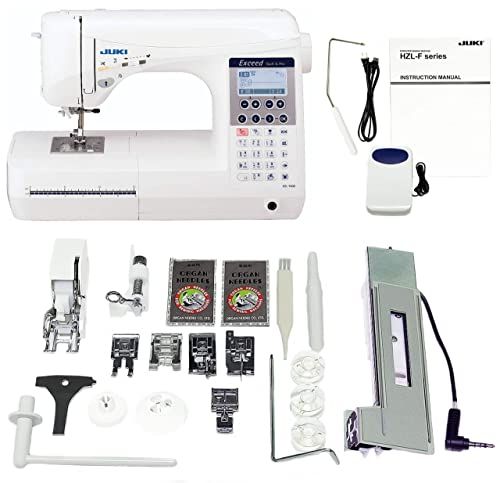 | 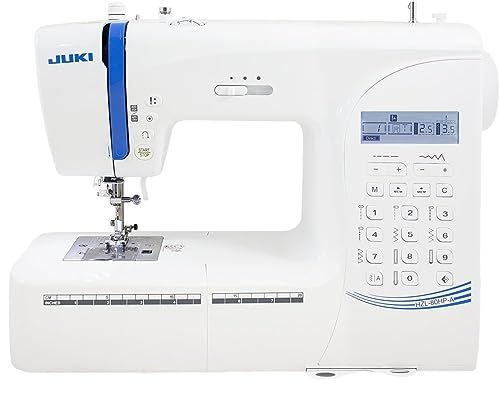 | 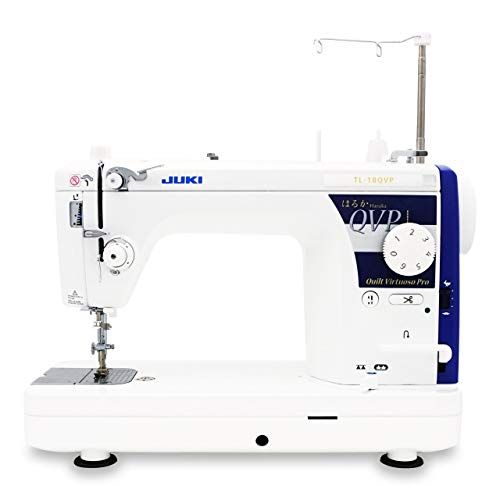 | 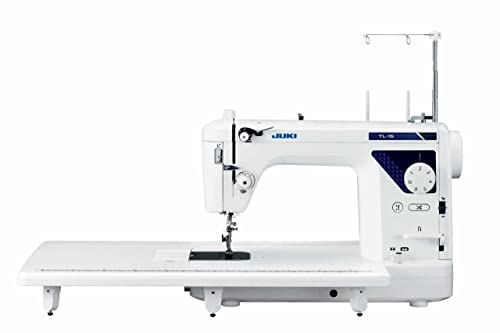 | 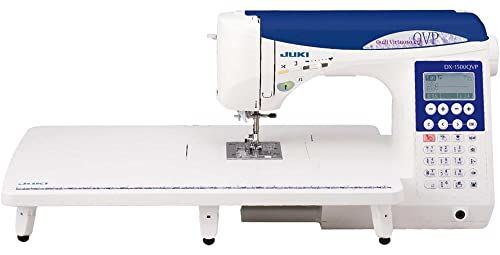 | |
|---|---|---|---|---|---|
| Model | Juki HZL-F400 Exceed Series: Computer Sewing Quilting Machine, White | Juki HZL-80HP: Sewing Machine with Automatic Needle Threader and Automatic One Step Buttonholing | Juki Haruka TL18QVP: Portable Quilting and Sewing Machine | Juki TL-15: 9" Mid-Arm Quilting and Piecing Machine with Auto Thread Trimmer and Speed Control | Juki DX-1500QVP: Computerized Sewing Machine |
| Brand | JUKI | JUKI | JUKI | JUKI | JUKI |
| Color | White | white, blue | white, blue | - | - |
| Country of Origin | China | - | - | - | - |
| Item Model Number | HZL-F400 | HZL-80HP | Haruka TL18QVP | Juki TL 15 | DX 1500QVP |
| Item Weight | 21.6 pounds | 19.71 pounds | 39.3 pounds | 30 pounds | 34 pounds |
| Manufacturer | JUKI | Juki | - | Juki | - |
| Is Electric | - | - | Yes | - | - |
| Product Dimensions | 17.49"D x 8.19"W x 11.49"H | 10.7"D x 20.2"W x 15.1"H | 14"D x 25"W x 18"H | 17.8"D x 8.6"W x 13.8"H | - |
FAQ
What is Juki?
Juki is a Japanese company that manufactures sewing machines and other sewing equipment. Founded in 1938, Juki is one of the leading brands in the home and industrial sewing machine market.
What types of sewing machines does Juki make?
Juki manufactures a wide range of sewing machines for home and industrial use. Some of their popular home sewing machine lines include mechanical, computerized, serger, quilting, and embroidery machines. For industrial purposes, they make machines for garment construction, upholstery, leatherwork, and more.
What are some key features of Juki sewing machines?
Juki sewing machines are known for their precision stitching, durability, and ease of use. Many models have features like automatic thread trimmers, knee lifters, speed control, and needle threaders. Computerized machines may have hundreds of built-in stitches, auto-buttonhole styles, and touchscreen displays.
Are Juki sewing machines beginner-friendly?
Yes, Juki has sewing machines suitable for beginners. Mechanical models like the Juki HZL-F300 and computerized options like the Juki HZL-DX7 offer user-friendly features ideal for new sewers. The instruction manuals are clearly illustrated.
What is the price range of Juki sewing machines?
Juki sewing machines range from $100 for a basic mechanical model to over $10,000 for industrial grade machines. Home sewing machines are typically priced between $300 - $1,500. The computerized embroidery models tend to be the most expensive for home use.
Where are Juki sewing machines made?
Juki has manufacturing facilities in Japan, China, and Vietnam. The higher-end computerized and industrial machines are typically made in Japan while entry level mechanical models are produced in the other factories.
Where can I purchase Juki sewing machines?
You can buy Juki sewing machines from authorized dealers online and in store. Some popular retailers include Joann, Hancock Fabrics, local sewing centers, and Amazon. Juki's website has a dealer locator tool to help find nearby stores.
Does Juki offer warranties on their sewing machines?
Yes, Juki sewing machines come with a manufacturer's warranty. The length and coverage varies by model, but common warranties are 10-25 years limited for mechanical parts and 5 years for computer components. Make sure to register your warranty with Juki.
Does Juki have sewing machine service centers?
Juki has service centers across the United States to provide maintenance, repairs and warranty work for their sewing machines. You can find your nearest authorized service center by using the locator on Juki's website.
What accessories are available for Juki sewing machines?
Juki offers a wide variety of accessories like presser feet, embroidery hoops and frames, quilting tables, roller feet, thread stands, sewing table extensions, and more. Check your instruction manual for compatible accessories or contact Juki customer service.
